Most Christian apologists and most preachers will usually be able to quote a list of names of ancient 'historians' or other writers who mentioned Jesus and will confidently assure us that these prove beyond reasonable doubt that the biblical Jesus existed and that the Gospels of Matthew, Mark, Luke and John are accurate biographies (in spite of the conflicting, contradictory and obviously anecdotal and/or invented details). It's almost as though Jesus was being regularly referred to in contemporary accounts and written about by all manner of historians of his day. No doubt at all that the Bible is real history and can be verified by independent eye-witness accounts.
Or that's the impression apologists want to give you - and some of them may actually believe it. But, as so often, the historical facts were very different to the claims of Christian apologists.
In his book, "Godless: How An Evangelical Preacher Became One Of America's Leading Atheists", Dan Barker tells how, when he became a free-thinker he realised how shallow had been his study of the documentary evidence for Jesus during his four years of religious study at Azusa Pacific College (now University).
Not that it was a bad class, but it seemed so unnecessary. It provided an answer to a question nobody was asking...
The class did not delve deeply into the ancient documents. We recited the roster of early historians and read some of the church fathers, and then promptly forgot them all. I figured that Christian scholars had already done the homework and that our faith rested on a firm historical foundation, and that if I ever needed to look it up I could turn to some book somewhere for the facts. I just never needed to look it up.p. 251. Perseus Books Group. Kindle Edition.
The usual list of 'historical documents' which 'prove' the historicity of Jesus, and which is routinely trotted out by Christian apologists, is usually a copy and paste from a Christian apologists on-line source. It will normally include:
Wow! Impressive, or what? Clearly masses of extra-biblical evidence!
Er... or maybe not.
| Photios I of Constantinople. What? No Jesus! |
Philo[-Judeus] was born before the beginning of the Christian era, and lived until long after the reputed death of Christ. He wrote an account of the Jews covering the entire time that Christ is said to have existed on earth.
He was living in or near Jerusalem when Christ's miraculous birth and the Herodian massacre occurred. He was there when Christ made his triumphal entry into Jerusalem. He was there when the crucifixion with its attendant earthquake, supernatural darkness, and resurrection of the dead took place -- when Christ himself rose from the dead, and in the presence of many witnesses ascended into heaven.
These marvelous events which must have filled the world with amazement, had they really occurred, were unknown to him. It was Philo who developed the doctrine of the Logos, or Word, and although this Word incarnate dwelt in that very land and in the presence of multitudes revealed himself and demonstrated his divine powers, Philo saw it not.
Another local historian of the time was a certain Justus of Tiberius who wrote a (now lost) chronicle of the kings of Israel from Moses to Agrippa II about which a ninth century patriarch of Constantinople Photios I complained:
He [Justus] makes not the least mention of the appearance of Christ, of what things happened to him, or of the wonderful works that he did.
Now to that list of Christian apologist's favourite 'historians':
| Source | Comment |
|---|---|
| Flavius Josephus 37 CE - c.100 CE (Also known as Titus Flavius Josephus, Joseph ben Matityahu, Yosef ben Matityahu or simply Josephus)  | Josephus was a highly regarded Roman historian and Messianic Jew who produced two major works - The Wars Of The Jews(seven volumes) and The Antiquities of the Jews (twenty-one volumes). It is the latter which contains the most often quoted 'proof' of the existence of the biblical Jesus, the so-called Testimonium Flavianum (Testimony of Flavius) written in c.90 CE:Now there was about this time Jesus, a wise man, if it be lawful to call him a man; for he was a doer of wonderful works, a teacher of such men as receive the truth with pleasure. He drew over to him both many of the Jews and many of the Gentiles. He was [the] Christ. And when Pilate, at the suggestion of the principal men amongst us, had condemned him to the cross, those that loved him at the first did not forsake him; for he appeared to them alive again the third day; as the divine prophets had foretold these and ten thousand other wonderful things concerning him. And the tribe of Christians, so named from him, are not extinct at this day. The problem with this is that it was written some 60 years after the supposed death of Jesus and cannot be considered a contemporaneous account, and not even the Testimonium Flavianum makes a claim to be the report of an eye-witness. It was written when, if this is to be believed, the myth of Jesus was already formed and Christian communities already existed, complete with the beliefs recorded here as facts. At best, this cannot be regarded as any more an authentic account of something than would a story about something happening in 1952 without the benefit of newspaper records, newsreels, magazines and official records. If you think that possible, ask anyone who was an adult in 1952, what the strike by the United Steelworkers of America was over and what President Truman's role was in the affair. Then check their account against the records. Do you think it would qualify as accurate, reliable history? The other problem with the Testimonium is that it's very probably either a total forgery; an interpolation added later, or a later elaboration of a brief original mention of an anecdotal account of an execution of a man called Jesus. Urban myths would have been no less common then than they are today. Dan Barker list seven reasons for thinking it may be an outright forgery:
As Dan Barker points out, if we remove this almost certainly forged paragraph from Josephus' Antiquities his works become evidence not for but against the historicity of Jesus. |
| Seutonius c. 69 – c. 122 (Also known as Gaius Suetonius Tranquillus)  | His most important surviving work is a set of biographies of twelve successive Roman rulers, from Julius Caesar to Domitian, entitled De Vita Caesarum. He recorded the earliest accounts of Julius Caesar's epileptic seizures. Other works by Suetonius concern the daily life of Rome, politics, oratory, and the lives of famous writers, including poets, historians, and grammarians. A few of these books have partially survived, but many have been lost. In about 112 CE Suetonius wrote in De Vita Caesarum, also know as The 12 Caesars, "[Claudius] banished the Jews from Rome, since they had made a commotion because of Chrestus,” and reported that under Nero, "punishments were also inflicted on the Christians, a sect professing a new and mischievous religious belief..." Nowhere does Seutonius mention Jesus by name and never refers to Jesus of Nazareth or Jesus Christ. Some Christians have claimed, with no basis whatsoever, that 'Chrestus' was a mistake and meant 'Christ'. Crestus is a name which simply means 'good' and was in common usage at that time in Rome, but even if it wasa mistake, 'Christ' could have meant the expected Messiah of the Jews of Rome. Suetonius also recorded that the body of Caesar Augustus rose bodily into heaven when he died. Few historians regard that as factual, least of all Christian ones. As historical proofs go, this is a great example of something that, well... isn't. |
| Pliny (the Younger) 61 CE – ca. 112 CE (Also known as Gaius Plinius Caecilius Secundus, Gaius Caecilius or Gaius Caecilius Cilo) 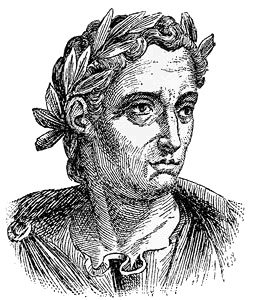 | Pliny is known for his hundreds of surviving letters, which are an invaluable historical source for the time period. Many are addressed to reigning emperors or to notables such as the historian, Tacitus. Pliny himself was a notable figure, serving as an imperial magistrate under Trajan (reigned AD 98–117). Pliny was considered an honest and moderate man, consistent in his pursuit of suspected Christian members according to Roman law, and rose through a series of Imperial civil and military offices, the cursus honorum (see below). He was a friend of the historian Tacitus and employed the biographer Suetonius in his staff. In 112 CE Pliny reported that "Christians were singing a hymn to Christ as a god..." And that's it. No mention of Jesus by name. It was normal for Messianic Jews then to refer to their current Messiah as (the) Christ so this could even be a reference not to Christians as we now use the term, but to a local Jewish sect. But even if it does refer to a group of Christians as we now understand the term, this is only a record of the beliefs of a group of people. It is not a record of Jesus, who supposedly died some 80 years earlier. Frankly, to call it contemporaneous, extra-biblical evidence is to stretch the meaning of the words 'contemporaneous' and 'evidence' beyond breaking point. |
| Tacitus 56 CE – 117 CE (Also known as Publius (or Gaius) Cornelius Tacitus)  | Publius (or Gaius) Cornelius Tacitus (AD 56 – AD 117) was a senator and a historian of the Roman Empire. The surviving portions of his two major works—the Annals and the Histories—examine the reigns of the Roman Emperors Tiberius, Claudius, Nero and those who reigned in the Year of the Four Emperors. These two works span the history of the Roman Empire from the death of Augustus in AD 14 to (presumably) the death of emperor Domitian in AD 96. There are substantial lacunae in the surviving texts, including one four-books long in the Annals. Around 117 CE, Tacitus wrote in Annals: Nero looked around for a scapegoat, and inflicted the most fiendish tortures on a group of persons already hated for their crimes. This was the sect known as Christians. Their founder, one Christus, had been put to death by the procurator, Pontius Pilate in the reign of Tiberius. This checked the abominable superstition for a while, but it broke out again and spread, not merely through Judea, where it originated, but even to Rome itself, the great reservoir and collecting ground for every kind of depravity and filth. Those who confessed to being Christians were at once arrested, but on their testimony a great crowd of people were convicted, not so much on the charge of arson, but of hatred of the entire human race. Tacitus does not paint a very flattering picture of Christians and this passage tells us nothing about Jesus of Nazareth whom he does not name and about whom he claims no first-hand knowledge. It only tells us of the then common ideas about Christians. As Dan Barker points out, this is the equivalent of someone today reporting that Mormons believe that Joseph Smith saw an angel. It does not make it historic proof. This is the only historical reference to Nero persecuting Christians, though he did persecute Jews. Perhaps Tacitus was confusing them with Christians as there was not a 'great crowd' of Christians in Rome in 60 CE, nor was the term 'Christian' then in use. Tacitus appears to be repeating a myth without checking the facts and even includes an allusion to Nero burning Rome, for which he needed a scapegoat, something which, despite the legend, never actually happened. |
| Thallus - Dates unknown | Thallus (Greek: Θαλλός), was an early historian who wrote in Koine Greek. Some scholars believe that his work can be interpreted as the earliest reference to the historical Jesus, and argue that it was written about 20 years after the Crucifixion. He wrote a three-volume history of the Mediterranean world from before the Trojan War to the 167th Olympiad, c. 112-109 BCE. Most of his work, like the vast majority of ancient literature, perished, but not before parts of his writings were repeated by Sextus Julius Africanus in his History of the World. A further problem for Christian apologists who want to rely on this account is that all the works of Africanus have also been lost. So, the only knowledge we have of Thallus and his reputed account of the 'Passover solar eclipse' (which is technically impossible given the relationship of Passover to the lunar cycle) is a putative quote from Africanus by a ninth century Byzantine writer, George Syncellus, a Christian monk and syncellus (literally, cell-mate) to Tarsius, patriarch of Constantinople. He can scarcely be called unbiased. As Dan Barker points out: We have no idea who Thallus was, or when he wrote. Eusebius (fourth century) mentions a history of Thallus in three books ending about 112 C.E. so the suggestion is that Thallus might have been a near contemporary of Jesus. (Actually, the manuscript is damaged, and "Thallus" is merely a guess from "_allos Samaritanos." That word "allos" actually means "other" in Greek, so it may have been simply saying "the other Samaritan.") |
Mara bar Serapion (dates unknown) | Mara bar ("son of") Serapion, sometimes spelled Mara bar Sarapion (sic) was a Stoic philosopher from the Roman province of Syria. He is noted for a letter he wrote in Syriac to his son, who was also named Serapion. The letter was composed sometime between 73 CE and the 3rd century, and may be an early non-Christian references to the crucifixion of Jesus. Although the other examples are named, no first name is given for the 'wise king', so this could equally refer to, for example, the Essene 'Teacher of Righteousness', who was killed by the Jews, whereas, so Christians believe and so the Gospels report, Jesus was killed by the Romans. The actual text is preserved in the British Museum having been obtained from an Egyptian monastery by Henry Tatton. The 1855 English translation of the key original Syriac text is: What else can we say, when the wise are forcibly dragged off by tyrants, their wisdom is captured by insults, and their minds are oppressed and without defense? What advantage did the Athenians gain from murdering Socrates? Famine and plague came upon them as a punishment for their crime. What advantage did the men of Samos gain from burning Pythagoras? In a moment their land was covered with sand. What advantage did the Jews gain from executing their wise king? It was just after that their kingdom was abolished. God justly avenged these three wise men: the Athenians died of hunger; the Samians were overwhelmed by the sea and the Jews, desolate and driven from their own kingdom, live in complete dispersion. But Socrates is not dead, because of Plato; neither is Pythagoras, because of the statue of Juno; nor is the wise king, because of the "new law" he laid down. Given the uncertainty over the date and the ambiguity of the reference, this cannot be regarded as serious historical evidence for the historicity of the biblical Jesus. |
| Lucian c. CE 125 – after CE 180 (Also known as Lucian of Samosata) 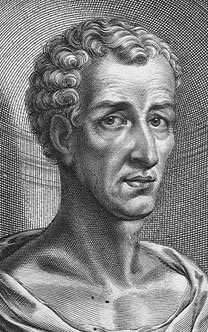 | Lucian of Samosata (Ancient Greek: Λουκιανὸς ὁ Σαμοσατεύς, Latin: Lucianus Samosatensis; c. CE 125 – after CE 180) was a rhetorician and satirist who wrote in the Greek language. He is noted for his witty and scoffing nature. Although he wrote solely in Greek, he was ethnically Assyrian. The often cited 'evidence' for the historicity of Jesus comes from a satire entitled The Passing of Peregrinus in which the eponymous character, Peregrinus Proteus, takes advantage of gullible Christians. In it he describes the basis for the Christian sect as "a man who was crucified in Palestine". But this was in the second century, when this would have been known anyway. It has no more historical value as a source document than would modern writing reporting the same thing. It is nothing more than the equivalent of saying the basis for Mormonism is a man who saw an angel. The real historical value of this source is that it is probably the earliest record of the pagan perception of Christians in the second century. |
| Phlegon 2nd Century. (Also known as Phlegon of Tralles) | Phlegon of Tralles (Ancient Greek: Φλέγων) was a Greek writer and freedman of the emperor Hadrian, who lived in the 2nd century AD. He is quoted as having made some passing references to the Jews but is not recorded anywhere as saying anything about anyone called Jesus nor anything which could be interpreted as a reference to him. It seems Phlegon is included in the traditional lists of historical 'proofs' of the historicity of Jesus merely to pad the list and make it look more impressive. |
| Tertullian c.160 – c. 225 CE (Also known as Quintus Septimius Florens Tertullianus)  | Quintus Septimius Florens Tertullianus, anglicised as Tertullian (c. 160 – c. 225 AD), was a prolific early Christian author from Carthage in the Roman province of Africa. He is the first Christian author to produce an extensive corpus of Latin Christian literature. He also was a notable early Christian apologist and a polemicist against heresy. Tertullian has been called "the father of Latin Christianity" and "the founder of Western theology". Tertullian was too late to be considered contemporaneous with Jesus or with anyone who might conceivably have known him. His writings are nothing more than early Christian apologetics, no more reliable as authentic history than those of any modern apologist. Again, he seems to be included in the lists as impressive-looking padding. |
| Justin Martyr 100 CE –ca.165 CE (Also known as Saint Justin) 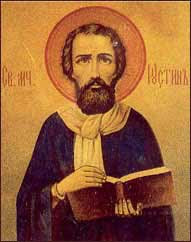 | Justin Martyr, also known as just Saint Justin (AD 100–ca.165), was an early Christian apologist, and is regarded as the foremost interpreter of the theory of the Logos in the 2nd century. Most of his works are lost, but two apologies and a dialogue did survive. He is considered a saint by the Roman Catholic Church and the Eastern Orthodox Church. Just another early Christian apologists who seems to be included by insecure modern Christian apologists who seek safety in numbers. |
| Clement of Rome 'flourished' c.96 CE (Also known as Pope Clement I, Saint Clement of Rome, Clemens Romanus) 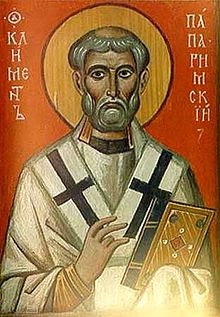 | Pope Clement I (fl. 96), also known as Saint Clement of Rome (in Latin, Clemens Romanus), is listed from an early date as a Bishop of Rome. He was the first Apostolic Father of the Church. The Catholic Church is hopelessly muddled about whether Clement was the second, third or fourth Pope after Peter. The only existing writing is a letter from him to the Christian congregation in Corinth in which he calls for the reinstatement of some deposed bishops on the grounds that they had been consecrated by the Apostles. It contains nothing which could be interpreted as a reference to a historic Jesus. Clement was merely stating the, by then, established Latin Christian dogma. Once again, mere padding for a list, which modern Christian apologists seem only too aware is embarrassingly meagre if only the sources with any realistic claim to substantiate the historicity of the biblical Jesus are included. |
| Ignatius from 35-50 to 98-117 CE (Also known as Ignatius of Antioch or Theophorus) 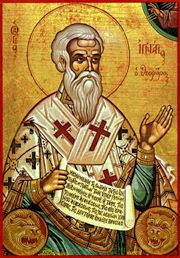 | Ignatius of Antioch (Ancient Greek: Ἰγνάτιος Ἀντιοχείας, also known as Theophorus from Greek Θεοφόρος "God-bearer") (ca. 35 or 50-between 98 and 117) was among the Apostolic Fathers, was the third Bishop of Antioch, and was a student of John the Apostle. En route to his martyrdom in Rome, he wrote a series of letters which have been preserved as an example of very early Christian theology. Important topics addressed in these letters include ecclesiology, the sacraments, and the role of bishops. Church tradition, which has no documentary support, says that Ignatius met Jesus as a child and was taken in his arms and blessed. This seems to be based on his 'stage name', Theophorus ('God Bearer') involving some curious notion of role reversal. He, along with his friend Polycarp (of whom more later) may have been disciples of the Apostle John. Many letters and other documents once attributed to him have been shown to be forgeries and others have been heavily doctored with interpolations. A claimed eye-witness accounts of his martyrdom is also a forgery. Probably included in the list to give it the caché of including some early Christian fathers and martyrs. |
Polycarp 69 – 155 CE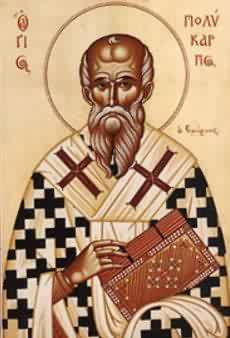 | Polycarp (69 – 155) (Ancient Greek: Πολύκαρπος) was a 2nd century Christian bishop of Smyrna. According to the Martyrdom of Polycarp he died a martyr, bound and burned at the stake, then stabbed when the fire failed to touch him. Polycarp is regarded as a saint in the Roman Catholic, Eastern Orthodox, Oriental Orthodox, Anglican, and Lutheran churches. The only extant document attributed to Polycarp is a letter to the Philippeans which shows a heavy reliance on the New Testament. At best, it can only be regarded as a statement of early Christian belief. Polycarp, like the preceding two members of the list, appears to be included to create a trio of early Christian Church Fathers. He has nothing to offer by way of historical authentication of the biblical Jesus either. Maybe the 'argument' is that, if they believed it, it must be true, maybe as a form of ancestor worship or quoting the beliefs of a Founding Father as 'proof' of that belief. |
| Clement of Alexandria c.150 – c. 215 CE (Also known as Titus Flavius Clemens) 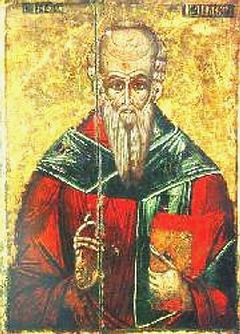 | Titus Flavius Clemens (c.150 – c. 215), known as Clement of Alexandria, was a Christian theologian who taught at the Catechetical School of Alexandria. A convert to Christianity, he was an educated man who was familiar with classical Greek philosophy and literature. As his three major works demonstrate, Clement was influenced by Hellenistic philosophy to a greater extent than any other Christian thinker of his time, and in particular by Plato and the Stoics. His secret works, which exist only in fragments, attest that he was also familiar with pre-Christian Jewish esotericism and Gnosticism. Among his pupils were Origen and Alexander of Jerusalem. It's hard to see why a Christian theologian who could not possibly have had any first-hand experience of events between 4 BCE and c.30 CE should be included in a list of people providing authentic, contemporaneous evidence for the biblical Jesus. List padding and a desire to mislead seems to be the only possible explanation. |
| Hippolytus 170 – 235 CE (Also known as Hippolytus of Rome)  | Hippolytus of Rome (170 – 235) was the most important 3rd-century theologian in the Christian Church in Rome, where he was probably born. Photios I of Constantinople describes him in his Bibliotheca (cod. 121) as a disciple of Irenaeus, who was said to be a disciple of Polycarp, and from the context of this passage it is supposed that he suggested that Hippolytus himself so styled himself. However, this assertion is doubtful. He came into conflict with the popes of his time and seems to have headed a schismatic group as a rival bishop of Rome. For that reason he is sometimes considered the first antipope. He opposed the Roman bishops who softened the penitential system to accommodate the large number of new pagan converts. Again, someone who could not and does not provide any direct, or indirect evidence for the historicity of the biblical Jesus, being born some 140 years too late, and who the early church did not hold in very high regard, seems to be there just to provide bulk in order to impress those who are too lazy to check and who will just accept the list on 'faith'. |
Origen c.184 - 253 CE (Also known as Origen Adamantius) 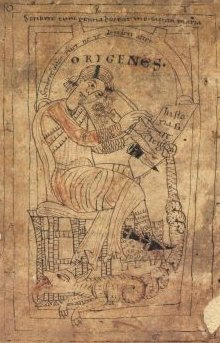 | Origen (Greek: Ὠριγένης Ōrigénēs), or Origen Adamantius (184/185 – 253/254), was an early Christian Alexandrian scholar and theologian, and one of the most distinguished writers of the early Church. As early as the fourth century, his orthodoxy was suspect, largely because he believed in the pre-existence of souls and apokatastasis, or universal reconciliation, ideas acknowledged to be beyond the pale of Christianity. Today he is generally regarded (in the Catholic Church) as one of the Church Fathers. Once again there seems to be no reason to include Origen in this list as his 'knowledge' can only ever have been received. Simply retrospectively rehabilitating a former heretic and elevating him to the status of Church Father does not add the weight of historical authenticity to his opinions. Historical authentication does not work by fiat. |
| Cyprian died September 14, 258 (Also known as Thascius Caecilius Cyprianus) 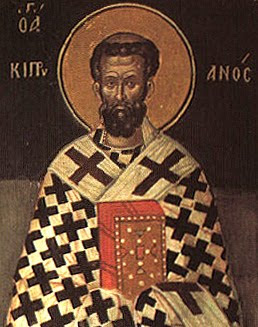 | Cyprian (Latin: Thascius Caecilius Cyprianus) (died September 14, 258) was bishop of Carthage and an important Early Christian writer, many of whose Latin works are extant. He was born around the beginning of the 3rd century in North Africa, perhaps at Carthage, where he received a classical education. After converting to Christianity, he became a bishop in 249 and eventually died a martyr at Carthage. Maybe not the least in the list, but thankfully the last in a list which would be more honest by its absence. |
So what have we from this impressive-looking list of sources which allegedly prove that the Biblical Jesus existed and was as described in the, often contradictory, Gospels in the New Testament, and as talked and written about by 'Paul' and others pretending to be Paul?
What we have is nothing at all which can't be dismissed as forgeries, hearsay, received 'wisdom' or merely statements of orthodox Christian dogma written by people with a personal commitment to belief in Jesus and/or a vested interest in promulgating it.
Jesus of Nazareth, as described in the Bible, is thus probably one of the least well-attested figures in all legend, on a par with King Arthur, Prester John, Rip van Winkle and William Tell. A person who no one alive at the time seems to have noticed or to have considered worth reporting on as a person of any importance.
